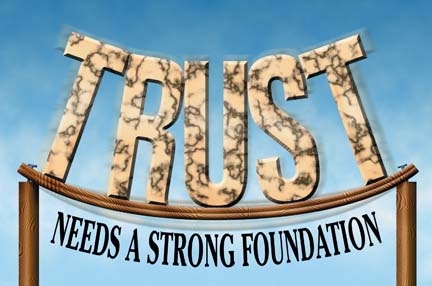

A forum for Hawaii's
business community to discuss
current events and issues

Trust needs
a strong foundation
Forthright approach builds
employee confidence
A colleague of mine, Jack Silversin, has reframed the notion of enemies of trust as "trust busters." I find that notion more meaningful, since it captures a painful truth. Building trust can be an agonizingly slow process, while destroying it can appear to occur in a split second.
Why "appear?" Because the sense of trust may have been teetering, may have been eroding from the foundation up, for a while, even before the "straw that broke the camel's back" became manifest.
Let's look at a few examples.
A town meeting to discuss the details of a rumored merger was scheduled three weeks ago. But each time, the day beforehand, it was rescheduled to the following week. Always justified with the reason: "We have some further analyses to do." Meanwhile, the rumors about how big the layoffs would be if there was a merger grew exponentially.
So when the chief executive finally stood up at the town the meeting, confirmed the merger and announced: "Every effort will be made to ensure a place is found for everyone," eyes darted back-and-forth and rolled back as if to say, "Yeah, and if you believe that, we have a bridge in Brooklyn we'd like to sell you!"
Inconsistent, abstract messages that feed rumors will, like termites, eventually erode trust. It is hard to imagine that employees will give this CEO the benefit of the many doubts they will have over the coming months.
A second example has to do with obvious double standards. It is not unusual in a health care organization to have one or two physicians who regularly verbally abuse the staff with whom they work. Because these physicians are typically also among the organization's biggest producers -- often adding several millions of dollars gross business -- the medical director, chief of staff, and other key administrators often adopt a posture of, "See no evil, hear no evil."
The corrosive effects of this trust-busting dynamic of double standards spreads far and wide. Motivation among deserving employees must suffer. Why? Because there is simply no honest answer to the question they will ask themselves, or ask aloud: "Why should I break my back if so-and-so can continue to get away with their behavior and still get all the same benefits?"
Supervisors who try to discipline their own employees will increasingly find themselves having martyr-like, whining conversations like those we all can recall having had with our teenage children: "Why do I have to do that if he doesn't?"
I was reminded of a third example recently as I was facilitating an off-site senior executive planning retreat. One of the group's members was missing, having announced her "early retirement" the day before the meeting. She had been having a very rocky time getting along with the CEO for months, so her leaving was not unexpected.
I watched carefully for the first 30 minutes or so as the group settled down and began to work through their agenda. They were flat and cautious, a bad combination any time, particularly for a vital strategic planning retreat.
There was clearly a red elephant on the table that no one was willing to discuss. When I offered that thought, the first reaction I got was feigned confusion.
A more direct approach was needed. So I asked everyone to take a few moments to jot down the facts, assumptions and fears they had about so-and-so's departure.
The discussion that followed uncovered several previous red elephants that had eroded the team's sense of trust in one another, and themselves. Had we just driven our way through this history, their new strategic plan might have been, as Harry Bellefonte warns us, "a house built on a weak foundation."
The Catch-22, of course, is that it takes courage and trust to identify and work on dynamics like inconsistent messages, double standards and red elephants that are eroding trust.
To participate in the Think Inc. discussion, e-mail your comments to business@starbulletin.com; fax them to 529-4750; or mail them to Think Inc., Honolulu Star-Bulletin, 7 Waterfront Plaza, Suite 210, 500 Ala Moana, Honolulu, Hawaii 96813. Anonymous submissions will be discarded.